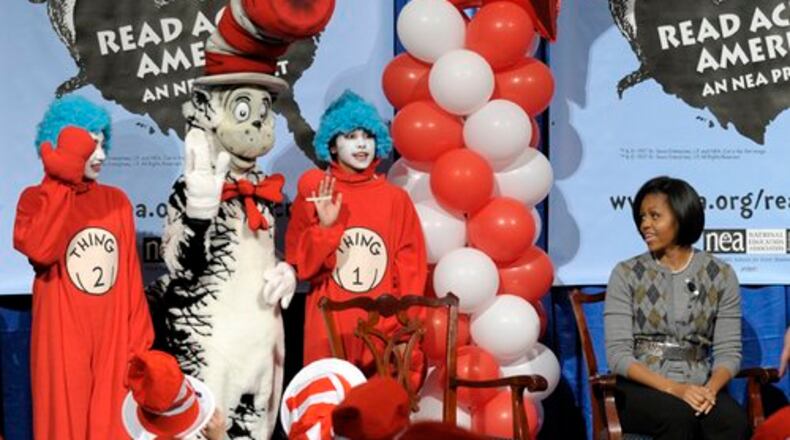America loves its doctors, from Dr. Kildare to Doc Watson to Dr. J. However, no doctor earns more affection than Dr. Seuss, author and illustrator of such children’s classics as “The Cat in the Hat” and “Horton Hears a Who!”
Former President Barack Obama once told a group of White House interns, “Pretty much all the stuff you need to know is in Dr. Seuss ... if I think about responsibility, I think about Horton sitting on the egg up in the tree, while lazy Mayzie’s flying off doing whatever she wants.”
Theodor Seuss Geisel, under the pen name Dr. Seuss, created a whimsical menagerie of feckless cats, faithful elephants and evil grinches. Three decades after his death at age 87 in 1991, Geisel’s books remain best sellers, earning an estimated $33 million in 2020 before taxes, up from just $9.5 million five years ago, according to the Dr Seuss Enterprises, which promotes and protects both his memory and his books.
Now, a few of those books have come under fire for racist caricatures, leading to an announcement today by the business that oversees the Dr. Seuss estate that it was ceasing publication of six titles, including “And to Think That I Saw It on Mulberry Street” and “If I Ran the Zoo.”
As Cobb parent and former teacher Charis Granger-Mbugua wrote in a column in this space Monday on her concerns about those Dr. Seuss books, “Black and African characters in his books are often depicted as monkeys and apes, while Asian characters are said to be ‘helpers that all wear their eyes at a slant’ from ‘countries no one can spell.’”
Dr. Seuss Enterprises said the decision was its own and grew out of months of review. “These books portray people in ways that are hurtful and wrong. Ceasing sales of these books is only part of our commitment and our broader plan to ensure Dr. Seuss Enterprises’ catalog represents and supports all communities and families. Dr. Seuss Enterprises listened and took feedback from our audiences including teachers, academics, and specialists in the field as part of our review process. We then worked with a panel of experts, including educators, to review our catalog of titles,” Dr. Seuss Enterprises said in a statement.
Also on the list of books that will cease to be published are “On Beyond Zebra!” “McElligot’s Pool,” “Scrambled Eggs Super!” and “The Cat’s Quizzer.”
The announcement drew immediate backlash with people citing the cancel culture and a loss of common sense. Conservative Congressman Jim Jordan, R-Ohio, tweeted: “If Dr. Seuss wanted to #DefundThePolice, his books wouldn’t be getting canceled.”
But there were also more tempered responses on social media: “These titles won’t be missed. They probably weren’t selling well anyway. Conservatives will scream that liberals are censoring Dr. Seuss. Plenty of his books are classics and stand the test of time. These don’t. We need to let go of children’s books that contain offensive/racist imagery,” said one commenter.
Indeed, Georgia Gov. Brian Kemp already jumped into the fray, posting on social media: “First Mr. Potato Head, now Dr. Seuss. Clearly, Democrats - with help from the Biden Administration - will cancel anyone and anything.”
It’s unclear how President Joe Biden could be said to have a hand in today’s news from Dr. Seuss Enterprises, which chose to announce its plan to stop publishing the six titles on the author’s birthday. Geisel’s March 2 birthday was the inspiration for Read Across America Day, an event launched in 1998 by the National Education Association to advance literacy and celebrated by most elementary schools in Georgia.
While some teachers still don the Cat in the Hat’s red and white striped stovepipe hat, others have followed the NEA’s lead and shifted the focus to diverse voices rather than Seuss classics. Many news reports suggest this NEA change of focus is new, but it goes back to 2017 when the NEA said Read Across America should celebrate a diversity of readers and books. And that has been happening in schools.
In Winder, for example, Kennedy Elementary School teacher Jodi Sorrells decided to literally have students read across America; she collected videos of people around the United States reading children’s books for students at her school. For example, one New York volunteer shared the book “Forest Green” while standing on frozen Lake George at the foothills of the Adirondacks.
The decision by Dr. Seuss Enterprises to cease publication of some books did not go over well with many people who said they read the books to their children and are now reading them to their grandchildren.
“I noticed that it doesn’t appear that Dr. Seuss Enterprises asked any parents regarding their thoughts on this issue,” said Teresa Collier of Smyrna. “Here we go again with left-wing wokeism regarding one of America’s revered characters, Dr. Seuss. I say this as a Black grandmother who purchased and read many Dr. Seuss books to my children and grandchildren. The cleverness of the linguistics in these books are extremely helpful in helping young children navigate the complexities of learning language and comprehension skills.”
Ebony Elizabeth Thomas of the University of Pennsylvania studies how portrayals of people of color in children’s literature shapes culture. I would like to give her the final word on this, from an article she wrote on the need for diverse children’s and young adults’ books:
When we face challenges to diverse book selections, our response can rightly be that we wish for every child to feel, as Walter Dean Myers once said, “as if they are part of America's dream, that all the rhetoric is meant for them, and that they are wanted in this country" Ultimately, this is why stories still matter, and always will.
About the Author
The Latest
Featured




